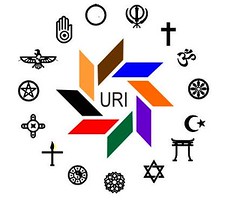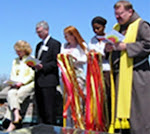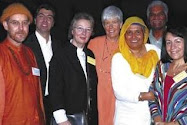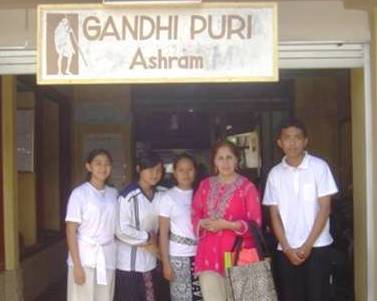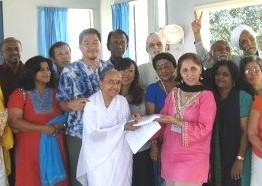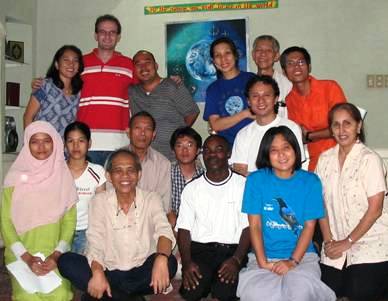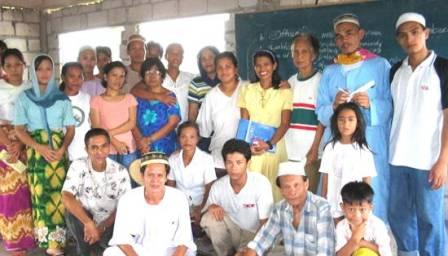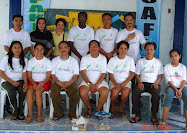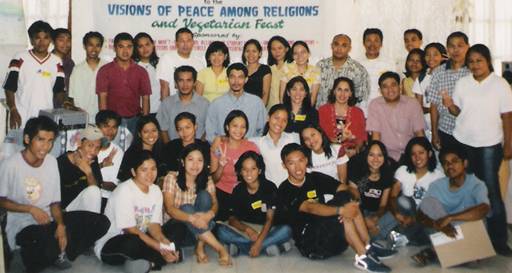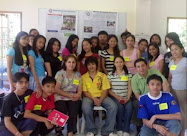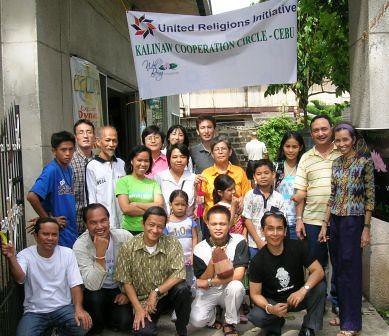
The Imams-Priests Dialogue training project that was conducted by
The Peacemakers’ Circle CC (PCFI-CC) in Metro Manila last September-October 2008 under the SGIDU Program inspired the creation of the
NATIONAL IMAMS-PRIESTS DIALOGUE FORUM (NIPDF) among its participants. Upon approval from the Australian Embassy of the proposal for the use of the unused funds of the project to support the ongoing process of strengthening the organizational model of the NIPDF, PCFI-CC organized a dialogue forum on
April 12, 2008 (Saturday) that brought together all the imams and priests who participated in the seminar-workshop.

The event hoped to aid them in their endeavors to find ways forward in organizing the NIPDF and addressing issues of common concern in the National Capital Region. Theme of the Forum was "Imams and Priests Dialogue for Ways Forward Together in Nation-Building." This was held at the U.P. Institute of Islamic Studies (UP-IIS), University of the Philippines in Diliman, Quezon City.

Aside from the members and participants of NIPDF and its partners (the Australian Embassy, Episcopal Commission on Inter-Religious Dialogue of the Catholic Bishops Conference of the Phils., UP-IIS, Imam Council of the Phils.), several representatives from the diplomatic and international community were also invited. Among the distinguished guests present were representatives from the Bishops-Ulama Conference, the Embassy of the Islamic Republic of Iran, the World Islamic Call Society, The Asia Foundation, and the URI Moral Imagination Peacebuilding Training Program visiting team -- composed of Dr. Herm Weaver (from U.S. ), Dr. Abraham Karickam (from India), and Sr. Mary Tarcisia Lakot (from Uganda).
 The Imams-Priests Dialogue training project that was conducted by The Peacemakers’ Circle CC (PCFI-CC) in Metro Manila last September-October 2008 under the SGIDU Program inspired the creation of the NATIONAL IMAMS-PRIESTS DIALOGUE FORUM (NIPDF) among its participants. Upon approval from the Australian Embassy of the proposal for the use of the unused funds of the project to support the ongoing process of strengthening the organizational model of the NIPDF, PCFI-CC organized a dialogue forum on April 12, 2008 (Saturday) that brought together all the imams and priests who participated in the seminar-workshop.
The Imams-Priests Dialogue training project that was conducted by The Peacemakers’ Circle CC (PCFI-CC) in Metro Manila last September-October 2008 under the SGIDU Program inspired the creation of the NATIONAL IMAMS-PRIESTS DIALOGUE FORUM (NIPDF) among its participants. Upon approval from the Australian Embassy of the proposal for the use of the unused funds of the project to support the ongoing process of strengthening the organizational model of the NIPDF, PCFI-CC organized a dialogue forum on April 12, 2008 (Saturday) that brought together all the imams and priests who participated in the seminar-workshop. The event hoped to aid them in their endeavors to find ways forward in organizing the NIPDF and addressing issues of common concern in the National Capital Region. Theme of the Forum was "Imams and Priests Dialogue for Ways Forward Together in Nation-Building." This was held at the U.P. Institute of Islamic Studies (UP-IIS), University of the Philippines in Diliman, Quezon City.
The event hoped to aid them in their endeavors to find ways forward in organizing the NIPDF and addressing issues of common concern in the National Capital Region. Theme of the Forum was "Imams and Priests Dialogue for Ways Forward Together in Nation-Building." This was held at the U.P. Institute of Islamic Studies (UP-IIS), University of the Philippines in Diliman, Quezon City. Aside from the members and participants of NIPDF and its partners (the Australian Embassy, Episcopal Commission on Inter-Religious Dialogue of the Catholic Bishops Conference of the Phils., UP-IIS, Imam Council of the Phils.), several representatives from the diplomatic and international community were also invited. Among the distinguished guests present were representatives from the Bishops-Ulama Conference, the Embassy of the Islamic Republic of Iran, the World Islamic Call Society, The Asia Foundation, and the URI Moral Imagination Peacebuilding Training Program visiting team -- composed of Dr. Herm Weaver (from U.S. ), Dr. Abraham Karickam (from India), and Sr. Mary Tarcisia Lakot (from Uganda).
Aside from the members and participants of NIPDF and its partners (the Australian Embassy, Episcopal Commission on Inter-Religious Dialogue of the Catholic Bishops Conference of the Phils., UP-IIS, Imam Council of the Phils.), several representatives from the diplomatic and international community were also invited. Among the distinguished guests present were representatives from the Bishops-Ulama Conference, the Embassy of the Islamic Republic of Iran, the World Islamic Call Society, The Asia Foundation, and the URI Moral Imagination Peacebuilding Training Program visiting team -- composed of Dr. Herm Weaver (from U.S. ), Dr. Abraham Karickam (from India), and Sr. Mary Tarcisia Lakot (from Uganda).